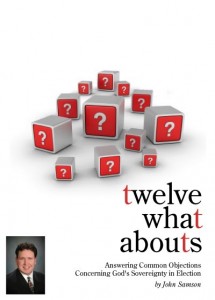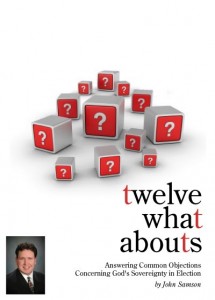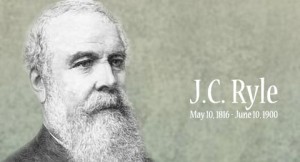 (1) TRANSLATIONS: Please join with me in prayer regarding the exciting possibility of my new book “Twelve What Abouts – Answering Common Objections Concerning God’s Sovereignty in Election” being translated into two foreign languages. I have recently been approached by two Christian brothers, the other into French. Both projects are in the VERY initial stages so I would appreciate your prayers for wisdom and guidance very much.
(1) TRANSLATIONS: Please join with me in prayer regarding the exciting possibility of my new book “Twelve What Abouts – Answering Common Objections Concerning God’s Sovereignty in Election” being translated into two foreign languages. I have recently been approached by two Christian brothers, the other into French. Both projects are in the VERY initial stages so I would appreciate your prayers for wisdom and guidance very much.
“Sometimes a single misapprehension or sticky question stands in the way of an honest believer’s examination of the doctrines of grace. John Samson answers those questions with a pastoral heart, yet with biblical fidelity.” – Dr. James White
Just a reminder – the book is in an eBook form now. The paperback edition should be published by the end of the month yet is available for pre-ordering through Solid Ground Books at the link to the right.
(2) Once again, Ligonier has some excellent deals today in this week’s $5 Friday sale. The online sale starts at 8 a.m. EST and goes on for 24 hours or until items are sold out. Check out the $5 Ligonier sale here.
(3) Would you consider taking 5 minutes of your day to pray for our persecuted brothers and sisters? You can read and pray over the World Watch List of 50 countries where the church is persecuted.
Michael Horton writes:
Newsweek‘s current cover-story is “The Global War on Christians in the Muslim World,” by Ayann Hirsi Ali, who fled her native Somalia and served in the Dutch Parliament before taking a position at the American Enterprise Institute. As the article points out, widespread anti-Christian violence is exploding even in countries with Muslim minorities. How do we respond wisely as Christians to this growing threat?
Horton goes on to give three actions we can take and work for: (1) prayer; (2) faithful witness; (3) human rights, not just Christian rights. You can read the whole thing here. (HT: JT)

 “Sometimes a single misapprehension or sticky question stands in the way of an honest believer’s examination of the doctrines of grace. John Samson answers those questions with a pastoral heart, yet with biblical fidelity.” – Dr. James White
“Sometimes a single misapprehension or sticky question stands in the way of an honest believer’s examination of the doctrines of grace. John Samson answers those questions with a pastoral heart, yet with biblical fidelity.” – Dr. James White From the new book, here’s an excerpt from the chapter entitled “A Word to the Reader”:
From the new book, here’s an excerpt from the chapter entitled “A Word to the Reader”: Here’s one text as an example: John 20:19 says, “On the evening of that day, the first day of the week, the doors being locked where the disciples were for fear of the Jews, Jesus came and stood among them and said to them, ‘Peace be with you.’”
Here’s one text as an example: John 20:19 says, “On the evening of that day, the first day of the week, the doors being locked where the disciples were for fear of the Jews, Jesus came and stood among them and said to them, ‘Peace be with you.’” Jonathan Edwards, preaching on Romans 5:8 to the Stockbridge Indians in February 1752, 260 years ago this month:
Jonathan Edwards, preaching on Romans 5:8 to the Stockbridge Indians in February 1752, 260 years ago this month: We should be careful to be Biblical, to be accurate, factual, on-target, articulate, proportionate, and appropriately concerned for showing that love which has God and His truth first in affection, and man a close second — and which remembers that truth and love are not mutually exclusive.
We should be careful to be Biblical, to be accurate, factual, on-target, articulate, proportionate, and appropriately concerned for showing that love which has God and His truth first in affection, and man a close second — and which remembers that truth and love are not mutually exclusive. A 9 part teaching series by Dr. Wayne Grudem:
A 9 part teaching series by Dr. Wayne Grudem: Dr. John Piper’s annual biographical message at the 2012 Conference for Pastors concerned the life and ministry of J. C. Ryle.
Dr. John Piper’s annual biographical message at the 2012 Conference for Pastors concerned the life and ministry of J. C. Ryle.

 The new birth is very, the leaving off of bad habits and the substituting of good ones. It is something different from the mere cherishing and practising of noble ideals. It goes infinitely deeper than coming forward to take some popular evangelist by the hand, signing a pledge-card, or “joining the church.” The new birth is no mere turning over a new leaf but is the inception and reception of a new life. It is no mere reformation but a complete transformation. In short, the new birth is a miracle, the result of the supernatural operation of God. It is radical, revolutionary, lasting.
The new birth is very, the leaving off of bad habits and the substituting of good ones. It is something different from the mere cherishing and practising of noble ideals. It goes infinitely deeper than coming forward to take some popular evangelist by the hand, signing a pledge-card, or “joining the church.” The new birth is no mere turning over a new leaf but is the inception and reception of a new life. It is no mere reformation but a complete transformation. In short, the new birth is a miracle, the result of the supernatural operation of God. It is radical, revolutionary, lasting.